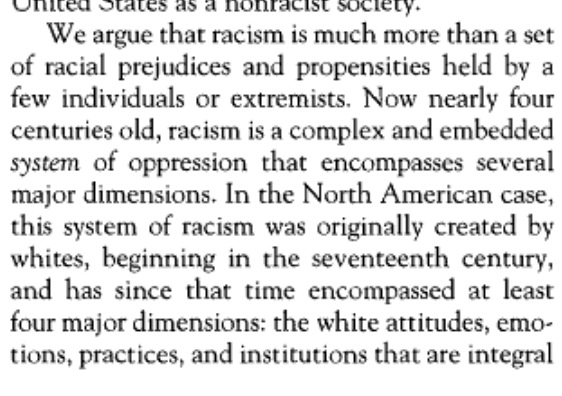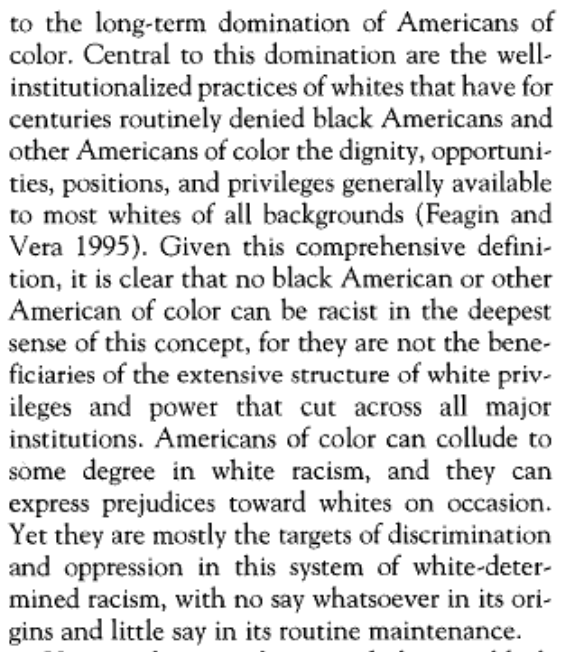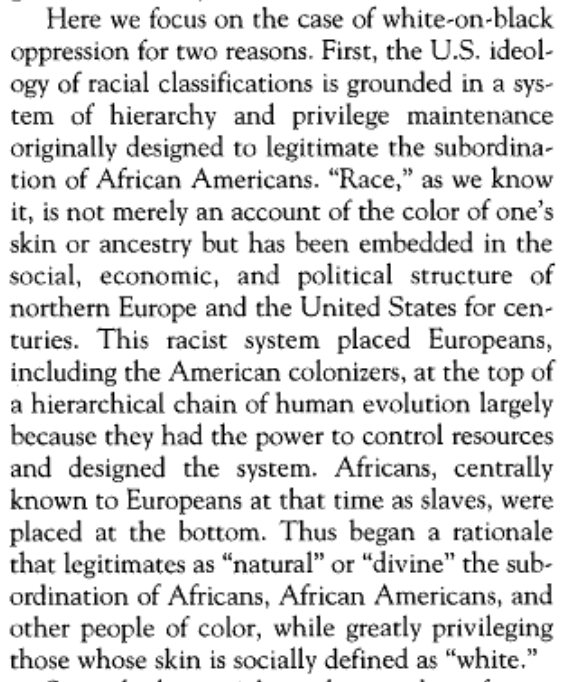Reagan's racist comments
Watching a YT video interview with Joe R. Feagin: https://www.youtube.com/watch?v=k-Q30H...
Let me watch some of Feagin's videos.
PVW said:
proeasdf said:
Never said "insists he has nothing to learn." You are attempting to smear me because I am asking questions (that you, and others, do not want asked apparently).
People have answered your questions. You've ignored or dismissed the answers. You're right, I don't want questions asked with such an attitude.
No attitude here.
Part of learning is asking questions and listening to answers. Impossible to listen to answers if no-one/few will answer my questions.
Thus, I have turned to Feagin's YT videos.
proeasdf said:
No attitude here.
Part of learning is asking questions and listening to answers. Impossible to listen to answers if no-one/few will answer my questions.
Thus, I have turned to Feagin's YT videos.
While skipping recommendations by those you wish to have a discussion with.
That’s an attitude.
Happy learning!
proeasdf said:
PVW said:
proeasdf said:
Never said "insists he has nothing to learn." You are attempting to smear me because I am asking questions (that you, and others, do not want asked apparently).
People have answered your questions. You've ignored or dismissed the answers. You're right, I don't want questions asked with such an attitude.
No attitude here.
Part of learning is asking questions and listening to answers. Impossible to listen to answers if no-one/few will answer my questions.
Thus, I have turned to Feagin's YT videos.
I agree with your assessment of the learning process. Obviously you have been answered in many cases, so which answers have you listened to and what conclusions did you draw from those answers? What made sense to you and what didn't make sense?
What are your questions today and what do you hope to learn from Joe Feagin? Listening to him is a great idea but you might also try to access some of his papers if you can. Here are three screenshots from one article on anti-racism that he contributed to. In the excerpt, they lay out the framework for institutional racism as it relates to controlling resources and creating a system that privileged whites above everyone else. They also theorize why Blacks and other non-white Americans cannot exist as 'racists'.
This is a preview page. Unfortunately, the entire article is behind a paywall but you may be able to find the original with a little effort.
https://www.jstor.org/stable/2654935?seq=1#page_scan_tab_contents
“Africans, centrally known to Europeans at that time as slaves, were at the bottom.”
Yesterday I read an illuminating (for me) review (also behind a paywall, alas) of a book on medieval African history that explores all that the Europeans didn’t know. Here’s an interview with the author:
flimbro said:
I agree with your assessment of the learning process. Obviously you have been answered in many cases, so which answers have you listened to and what conclusions did you draw from those answers? What made sense to you and what didn't make sense?
What are your questions today and what do you hope to learn from Joe Feagin? Listening to him is a great idea but you might also try to access some of his papers if you can. Here are three screenshots from one article on anti-racism that he contributed to. In the excerpt, they lay out the framework for institutional racism as it relates to controlling resources and creating a system that privileged whites above everyone else. They also theorize why Blacks and other non-white Americans cannot exist as 'racists'.
This is a preview page. Unfortunately, the entire article is behind a paywall but you may be able to find the original with a little effort.
https://www.jstor.org/stable/2654935?seq=1#page_scan_tab_contents
Thanks!! I will take a look.
You're welcome.
And don't forget, when you have a minute and for the sake of learning it would be helpful to know what stuck with you and what didn't
You have been answered in many cases, so which answers have you listened to and what conclusions did you draw from those answers? What made sense to you and what didn't make sense?
What are your questions today and what do you hope to learn from Joe Feagin?
PVW said:
proeasdf said:
Never said "insists he has nothing to learn." You are attempting to smear me because I am asking questions (that you, and others, do not want asked apparently).
People have answered your questions. You've ignored or dismissed the answers. You're right, I don't want questions asked with such an attitude.
How do you go about determining attitude online (PVW wrote above: "I don't want questions asked with such an attitude.")?
I never use emojis, and I almost never curse, or use coarse language. My best understanding of your "attitude" statement is that you are using "attitude" as a metaphor for questions-that-should not-be asked. Let me know if I am getting warm.
flimbro said:
You're welcome.
And don't forget, when you have a minute and for the sake of learning it would be helpful to know what stuck with you and what didn't
You have been answered in many cases, so which answers have you listened to and what conclusions did you draw from those answers? What made sense to you and what didn't make sense?
What are your questions today and what do you hope to learn from Joe Feagin?
Still watching various Feagin videos. I will definitely follow-up with more questions.
Again, thanks.
proeasdf said:
My best understanding of your "attitude"statement is that you are using "attitude" as a metaphor for questions-that-should not-be asked. Let me know if I am getting warm.
You may be confusing PVW’s “You've ignored or dismissed the answers“ with “a metaphor for questions-that-should not-be asked.”
I will definitely follow-up with more questions.
Here’s hoping any confusion between that and responsiveness to flimbro’s “What made sense to you and what didn’t make sense?” can be avoided.
DaveSchmidt said:
“Africans, centrally known to Europeans at that time as slaves, were at the bottom.”
Yesterday I read an illuminating (for me) review (also behind a paywall, alas) of a book on medieval African history that explores all that the Europeans didn’t know. Here’s an interview with the author:
Thanks for this.
Look man, don't get me going on book lists...
OK, maybe just one or two or three.
Civilization or Barbarism - Cheikh Anta Diop (and anything else by Diop re African history)
Black Athena - Martin Bernal
The Muslim Discovery of Europe - Bernard Lewis
They Came Before Columbus - Ivan Van Sertima
and find anything from John Henrik Clarke on YouTube (a Great & Mighty Walk is a biographical film on him)
proeasdf said:
How do you go about determining attitude online (PVW wrote above: "I don't want questions asked with such an attitude.")?
In my full quote, I'm pretty clear on what kinds of questions I don't want asked -- questions where the questioner "ignored or dismissed the answers". The fact that you can then come back and ask what I mean by attitude despite my explaining it in the very reply you are quoting means either you don't actually want answers, or are unable to understand them. Why would I (or anyone) wish to engage with someone who either cannot or will not acknowledge answers to their questions?
flimbro said:
DaveSchmidt said:
“Africans, centrally known to Europeans at that time as slaves, were at the bottom.”
Yesterday I read an illuminating (for me) review (also behind a paywall, alas) of a book on medieval African history that explores all that the Europeans didn’t know. Here’s an interview with the author:
Thanks for this.
Look man, don't get me going on book lists...
OK, maybe just one or two or three.Civilization or Barbarism - Cheikh Anta Diop (and anything else by Diop re African history)
Black Athena - Martin Bernal
The Muslim Discovery of Europe - Bernard Lewis
They Came Before Columbus - Ivan Van Sertima
and find anything from John Henrik Clarke on YouTube (a Great & Mighty Walk is a biographical film on him)
Thanks for this. I like to alternate my reading between fiction and non-fiction. I'm currently reading Circe, and Black Athena looks like a good follow up based on the outline. I'll admit being completely unaware of the controversy there -- I don't think I ever gave much thought to the origins of Greek civilization. Do you happen to know the current "mainstream" position on that? Is Bernal's position generally accepted now or is it still seen as challenging the status quo?
the last few posts are a sobering reminder of just how much I don't know.
My father would say: The more you know, the more you realize you don't know.
@PVW
You're welcome! I think I have a friend working on a TV adaptation of Circe.
Black Athena would be a great follow up. I should also warn that it comes in three volumes- (Bernal was not joking) so this is not a casual endeavor. Volume 1 is sufficient to pull you in. It's pretty much an academic tome, so it's dense going for a while but if you're acquainted with the general western version of Greek history and the surrounding area it's fascinating. The controversy is pretty simple on its face. Bernal says (among other things) that Egypt colonized Greece and provides 'proof' citing the work of African historians, Egyptologists and Greek historians. He focuses on specific social customs, political procedures, architectural styles and linguistics we've come to identify as uniquely 'Greek' as hallmarks of Egyptian culture. Eurocentric scholars don't agree and suggest that Greece was probably only 'influenced' by Egypt and chose to adopt so much of Egyptian culture as an homage of sorts.
The insertion of Africa as a world power/cultural force in any capacity has always been hotly contested by western (mostly white) scholars and proponents of a eurocentric world view. Bernal (and many other scholars) note that this modern eurocentric perspective is informed by racism and anti-Semitism which obviously leaves little room to entertain notions of an African origin for anything.
I don't follow these things as closely as I used to, but in general, the mainstream thinking is still reluctant to allow for African/Semitic influence although it has softened somewhat. But even when eurocentric historians accept the basis of Bernal's analysis they quickly pivot and qualify their acceptance by describing ancient Egypt as a non-African (as in not Black African) country and some revert to the old eurocentric idea that ancient Egypt was founded by Indo-Europeans from the north. I always thought this was an amazing jump of logic since at the time (per my Western education) those nomadic groupings could barely feed themselves much less establish the incredibly advanced societies that dotted northern, western and eastern Africa. So as you can imagine suggesting that the birthplace of Western civilization was actually under the thrall of an African nation quickly becomes a debate that challenges the modern myth of white supremacy.
Black Athena falls in with the work of many other scholars, some Afrocentric, who include African and Asian history as a basis of their work.
Here's a link to a debate between John Henrik Clarke, Martin Bernal, Mary Lefkowitz and Guy Rogers (author and co-authors of 'Not Out Of Africa'). It's long, but the first 45 minutes are entertaining if you're into this kind of stuff:
https://www.youtube.com/watch?v=fmei-hUQUWY
John Henrik Clarke describes his decision to study Africa at a very young age and pretty much explains why his scholarship is required:
"What baffled me from the beginning was the Bible itself. I could not find my people in a book that was supposed to be about all mankind. And what called my attention to the neglect of Africa was the Sunday school lessons with all those white angels. And when they said God is love, God is kind, God has no respect of kith or kin, I kept wondering why he didn't let at least one or two little black or brown angels sneak into heaven. So I began to suggest that somebody else had tampered with God's book in favor of somebody else..."
And here's an old Newsweek article about Bernal and Black Athena:
There’s nothing like visiting Powell’s City of Books in Portland, period, but it’s even better when recommendations give you at least a little anchorage in an otherwise blissfully aimless day in the stacks.
So I’m happy to add Diop’s The African Origin of Civilization and Lewis’ The Muslim Discovery of Europe (no Bernal available) to my “homework.” Thanks for pointing me in their direction, flimbro.
Hitler: Make Germany Great Again
Reagan: Make America Great Again
Trump: Make America Great Again
Let's face it, we all know how this Republican movie is going to end
DaveSchmidt said:
There’s nothing like visiting Powell’s City of Books in Portland, period, but it’s even better when recommendations give you at least a little anchorage in an otherwise blissfully aimless day in the stacks.
So I’m happy to add Diop’s The African Origin of Civilization and Lewis’ The Muslim Discovery of Europe (no Bernal available) to my “homework.” Thanks for pointing me in their direction, flimbro.
Anytime @DaveSchmidt!
I’ve heard great things about the rare books room at Powell’s. Got to get out there and see it for myself. Amazon has paperback editions of the Black Athena volumes.
I’m halfway through the Lewis, debating whether to continue. I probably will, but it’s repetitive, and the theme was plain early on: It’s not The Muslim Discovery of Europe but instead, as Lewis disdainfully frames it, The Muslim Disregard of Europe. See how the Turks, Arabs and Persians, confident in their superiority and repulsed by the corrupt Christian faith, paid no heed to European culture or history, because scant evidence of any Muslim knowledge of Europe survives. (And what does is mostly secondhand and riddled with errors.) Meanwhile, the intellectual curiosity of the Europeans is obvious in the expansive works they left to posterity.
Suspecting that this conclusion didn’t stand without objection, I came upon the early-1980s dispute between Lewis and Edward Saïd, over Saïd’s 1978 work, Orientalism. Specifically, an exchange of letters to the New York Review of Books, where Lewis had written an essay critical of Orientalism. Saïd’s response was factual and measured; Lewis’s reply started, “It is difficult to argue with a scream of rage,” and continued in the same peevish vein.
(I also came upon Christopher Hitchens’ valediction after Saïd died in 2003. Hitchens spent a few sentences dwelling on what he called Saïd’s thin skin. It reminded me of MOL replies that have called flimbro’s MOL comments “angry.” A clearer case of white projection is hard to imagine.)
The Diop book, which I finished several months ago, was more satisfying. Unlike Lewis, he addressed the counterarguments of his peers and predecessors head-on. Even when I wasn’t entirely convinced, I appreciated Diop’s eagerness to take on all comers. I left The African Origin of Civilization thinking that my knowledge had been challenged, and broadened, honestly.
Sponsored Business
Promote your business here - Businesses get highlighted throughout the site and you can add a deal.























People have answered your questions. You've ignored or dismissed the answers. You're right, I don't want questions asked with such an attitude.